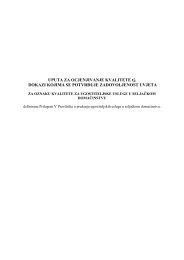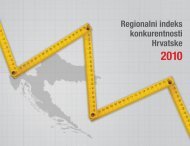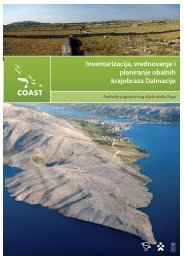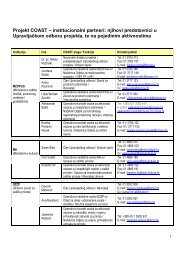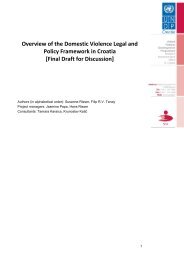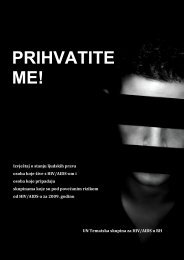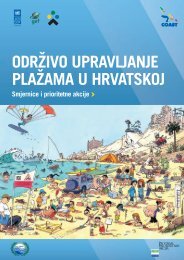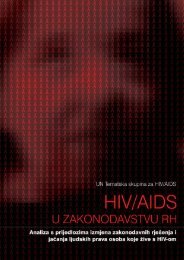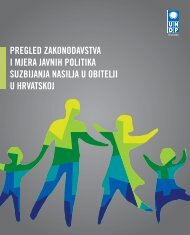WEB engleska verzija end.indd - UNDP Croatia
WEB engleska verzija end.indd - UNDP Croatia
WEB engleska verzija end.indd - UNDP Croatia
- No tags were found...
You also want an ePaper? Increase the reach of your titles
YUMPU automatically turns print PDFs into web optimized ePapers that Google loves.
CHAPTER 3THE SOCIALLY EXCLUDED3.5.5 Access to Employment andEmployment ServicesTheir particular disability often reduces the workingcapacity of people with physical disabilities, makingit more difficult for them to find employment, thus oftenleading to poverty and social exclusion. Employmentopportunities are very limited, and about 5,800people with disability are registered with employmentbureaux. Discrimination in employment may resultfrom the financial costs that employers would have toundertake to modify their place of work in a way thataccommodates disabled individuals. However, mostdiscrimination stems from a lack of awareness on theside of both employers and people with disabilities,and negative attitudes towards the disabled.As with most people, unemployment among the disabledcan result in depression, a loss of confidence,and diminished self-worth. Many retire too young,receive social assistance, and require continual supportby their families. Families are also exposed to thepressures of everyday life and taking care of a disabledfamily member can strain relations within the family.This kind of social and family pressure will logicallycause feelings of guilt and a sense of hopelessness ina person with disability.Innovative programmes designed to resolve employmentissues for disabled people have involved formingcooperatives for the employment of people with disability.86 It is also necessary to develop new organisationalforms of finding employment for them, as thecurrent models have not yielded satisfactory results.Box 7: A positive example by the initiative of the <strong>Croatia</strong>n Union of Physically Disabled PersonsAssociations: A pan-<strong>Croatia</strong>n campaign of alerts to parking places for persons with disabilityIn <strong>Croatia</strong>, people with physical disabilities have great difficulty with parking spaces, to the point wherethis impacts their quality of life. This is why the <strong>Croatia</strong>n Union of Physically Disabled Persons Associations(HSUTI) launched an all-<strong>Croatia</strong>n initiative calling on people with disabilities, their associations, theMinistry of the Interior, Ministry of Health and Social Welfare, Ministry of the Sea, Tourism, Transport andDevelopment, scouts, young members of the Red Cross, and representatives of the local government toembrace a level of tolerance that exists in other developed countries. Leaflets with the wording “People,this is not a joke!” were placed on the windshields of cars. Local communities throughout <strong>Croatia</strong>received pertinent information, which was also presented on the web-sites of the HSUTI and otherassociations, as well as the sponsor, the Foundation for Civil Society Development. Local authoritiesand their representatives in towns were also involved. For example, in the City of Zagreb, the mayor wasdistributing flyers to the people of Zagreb; he was joined by the state secretary for social welfare andmembers of the Parliament. Numerous radio shows broadcasted the campaign in Zagreb, Koprivnica,Rijeka and other towns in Dalmatia and western <strong>Croatia</strong>.The campaign strongly resounded with the public, resulting in more “yellow” parking places availablefor the people with disabilities. At their technical examinations of vehicles, drivers received a leafletreminding them about the legislation and parking the disabled. This was followed by placing strikingtexts on the parking payment slips that read: “recipient: negligent driver; purpose: fine for violation ofbasic human right to movement of persons with disability”. In cooperation with the police and children,“leaflet-payment slips” were also placed on the windshields of cars. The intention was to challengecomplacency and encourage respect for the rights of this vulnerable group.6886 The Cooperative for Employment of Invalids in Pula gives the following explanation: “Under the presumption that about 10% of thepopulation of persons with disabilities have the required capacity to work at least a little, it seems justifiable to do something to help themachieve better results towards the realisation of their indep<strong>end</strong>ence for economic security. Things that people with disabilities do at homeas a hobby, for fun, where they make relatively small quantities of uncontrolled quality, can always be transformed into a business andprofit can be generated. This can be done through cooperatives – as a new form of community-based action. Cooperatives are a new andacceptable way of private economic initiatives of physical persons (entrepreneurs) with small and/or temporary businesses. Cooperativeshelp reduce the initial investments and risks and they yield better repro material acquisition costs, and the costs are negligible.”



